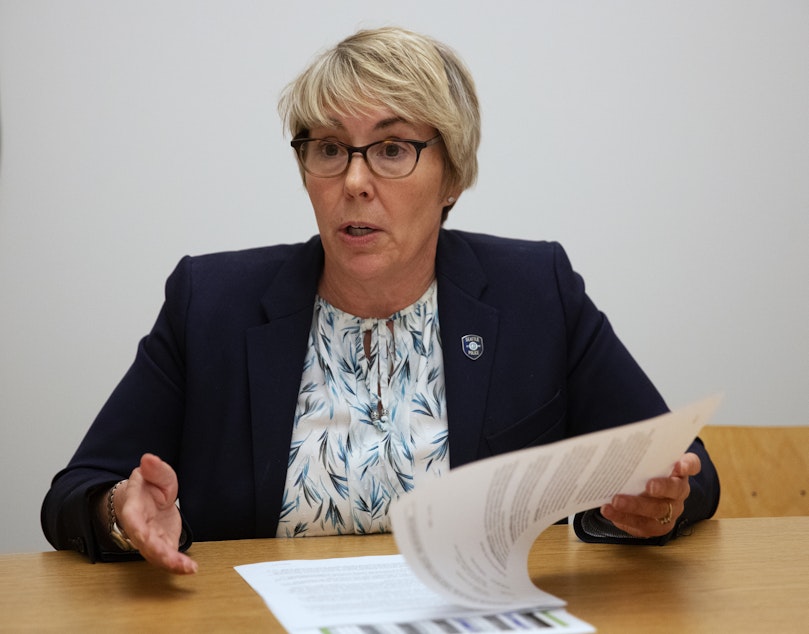Seattle police captain was moved to nights after suing chief. ‘Retaliatory act,’ her attorney says

Deanna Nollette, a Seattle Police captain, was moved last week to night shift, roughly two months after she sued the department and her boss, Police Chief Adrian Diaz, for gender discrimination. It’s a move her lawyer called retaliation.
“I believe this is a retaliatory act to intimidate other women in the department who have also experienced discrimination,” Judith Lonnquist, Nollette’s lawyer, said by phone Friday evening. The night shift is among the least desirable – and a far cry from the assistant chief position Nollette held until July.
Lonnquist said that since Nollette filed her suit, four other women employed by Seattle Police have reached out to her about their own experiences with gender discrimination.
The Seattle Police Department did not respond to a request for comment by publication time. But Ted Buck, Diaz’s personal attorney, told KUOW last month by email that Nollette’s claims are "wholly unfounded" and that “the chief’s overt support of women in departmental leadership has been clear and consistent.”
Deputy Chief Eric Barden announced in a staff-wide email on Feb. 12 that Nollette was moving to nights – seven months after Chief Diaz demoted her to captain. Diaz demoted Assistant Chief Eric Greening at the same time.
Sponsored
Nollette, a veteran Seattle cop of 27 years, and Greening had applied to be Seattle police chief before Mayor Bruce Harrell announced that he would promote Diaz, who was interim chief at the time.
Nollette filed a lawsuit against Diaz and the department in January, saying that her boss has a “history of misogyny” and is “demeaning to women in the police force.”
Nollette’s lawsuit said that in one instance, Diaz invited colleagues to play flag football. When Nollette suggested to Diaz that their female colleagues might not want to play, he replied they could be cheerleaders, according to the lawsuit.
Nollette said in the lawsuit that Diaz excluded the input of female command staff, and that women were excluded from travel, training, and networking opportunities.
Lonnquist said she has referred the four women who have contacted her to the U.S. Equal Employment Opportunity Commission, a federal agency that investigates allegations of employment discrimination.
Sponsored
The Seattle Police Department is part of the 30x30 Initiative, which has an objective of recruiting more women to the department.
As part of this initiative, Seattle Police hired a researcher from Washington State University to conduct interviews with sworn and civilian female employees at the department about their working conditions.
Some of these women described a “good old boys club” within the department and depicted instances of sexual harassment and gender discrimination by colleagues.
The study was turned over to the police department in September of last year, but they did not publicly publish it until seven hours after KUOW contacted the department for comment.
Reach KUOW reporter Ashley Hiruko at hiruko@kuow.org.



